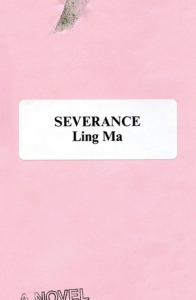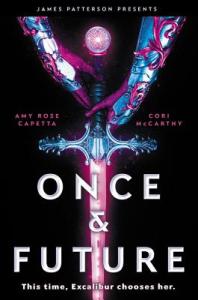Title: Severance
Author: Ling Ma
Genre: Satire/Post-Apocalyptic/Horror
Trigger Warnings: Death, body horror, terminal illness, zombies, blood, gore, bodily fluids, existential horror, sexual content (minor), guns, death of children, pregnancy, confinement, death of parents, drug use (mentions), suicide, suicidal thoughts, car crash (mention), child abuse (mentions), religious bigotry, alcohol use, vomit (mentions)
Back Cover:
Candace Chen, a millennial drone self-sequestered in a Manhattan office tower, is devoted to routine. With the recent passing of her Chinese immigrant parents, she’s had her fill of uncertainty. She’s content just to carry on: She goes to work, troubleshoots the teen-targeted Gemstone Bible, watches movies in a Greenpoint basement with her boyfriend.
So Candace barely notices when a plague of biblical proportions sweeps New York. Then Shen Fever spreads. Families flee. Companies cease operations. The subways screech to a halt. Her bosses enlist her as part of a dwindling skeleton crew with a big end-date payoff. Soon entirely alone, still unfevered, she photographs the eerie, abandoned city as the anonymous blogger NY Ghost.
Candace won’t be able to make it on her own forever, though. Enter a group of survivors, led by the power-hungry IT tech Bob. They’re traveling to a place called the Facility, where, Bob promises, they will have everything they need to start society anew. But Candace is carrying a secret she knows Bob will exploit. Should she escape from her rescuers?
A send-up and takedown of the rituals, routines, and missed opportunities of contemporary life, Ling Ma’s Severance is a moving family story, a quirky coming-of-adulthood tale, and a hilarious, deadpan satire. Most important, it’s a heartfelt tribute to the connections that drive us to do more than survive.
Review:
I barely skimmed the back cover before picking this up. I’m trying to read more broadly. I don’t think I’ve ever knowingly read a satire, it’s by a Chinese author featuring a Chinese protagonist, and looked to be satirizing the meaninglessness of modern work culture (relatable) and post-apocalyptic fiction (I’ve read a lot, could be interesting).
This was published in 2018, but I had to check. I think it was supposed to be satire of the modern millennial life in NYC or modern work or the post-apocalyptic genre or all of the above. In 2018, maybe it was. But in February 2022, nearly two years into a deadly global pandemic that varies only slightly from the “epidemic” of the book, Severance isn’t satire – it’s prophetic.
This book is told out of order, altering back and forth between Before and After. Before and After what isn’t obvious in the book, but it’s clear to me. I can’t pinpoint a particular event or moment, but my life has definitely divided into Before Covid and After Covid. As Candace says, “It seemed to happen gradually, then suddenly.” Candace keeps going into work as everything slowly crumbles, keeps trying to do her job even though there’s less and less job to do, until suddenly it’s After and nothing is the same.
I am not going to talk about the After timeline. It has its own emotions and its own kind of horror, but the Before timeline is what mattered most to me.
I didn’t think I had much if any of that “collective pandemic trauma” people talk about. Then I read Severance, and it turns out I do. When Candace’s job started requiring N95 masks, I felt a sinking familiarity. When a character first said the phrase “these uncertain times,” it felt like a punch in the gut. This book pulls on the trauma of living through a pandemic and the horror of surviving an apocalypse and combines them into something vividly repulsive and hideously possible. It evokes the visceral terror of being in a place usually full of people and discovering you are alone; the agonizing helpless realization that even if you survive this, there is no future; the despair of knowing that even if the world is ending, the only thing you can do is get up and go to work.
I read this as an audiobook at work, my mind lost in the horror and despair of this barely-fictional world while my hands, nearly independent of the rest of me, did my job. Scan the box. Open the box. Take out the bag. Label the bag. Put the bag in a new box. Label the new box. I repeat the same process over and over again, just like the epidemic victims in the book. I think that – the monotonousness and mindlessness of modern work – is what Severance is supposed to be satirizing. But that is not what I took from it.
If there is an apocalypse, it won’t be like any of my post-apocalyptic novels. If it’s like any work of fiction, it will be like this. And if that’s the case, I don’t think I want to survive. I took several books off my to-read list. I have no more desire to read any post-apocalypses. I am too afraid of surviving the end of the world.
I’ve never legitimately described a book as life-changing before, but Severance is. I feel like I’ve just realized the world is about to end and can’t understand everyone continuing on and worrying about unimportant stuff. After I put the book down I felt off-kilter, like my life (or my psyche) was in a box that just got knocked off a table and nothing inside can ever be the same again. I feel like I have to sit down and figure out what actually matters because most of the shit I’m doing now just doesn’t.
Severance feels terrifyingly, painfully, imminently possible. If no one ever recovered from covid, we might be living in the world of Severance right now.
This book is not satire. It’s psychological, existential horror.


